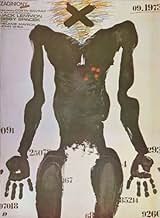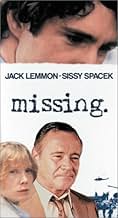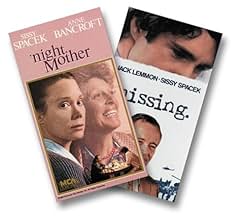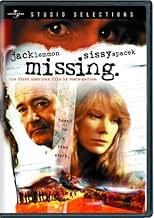Lorsqu'un écrivain américain idéaliste disparaît lors du coup d'État chilien de septembre 1973, sa femme et son père tentent de le retrouver.Lorsqu'un écrivain américain idéaliste disparaît lors du coup d'État chilien de septembre 1973, sa femme et son père tentent de le retrouver.Lorsqu'un écrivain américain idéaliste disparaît lors du coup d'État chilien de septembre 1973, sa femme et son père tentent de le retrouver.
- Réalisation
- Scénario
- Casting principal
- Récompensé par 1 Oscar
- 12 victoires et 23 nominations au total
- Paris
- (as Martin Lasalle)
Avis à la une
The film itself remains a gripping eyeopener from first to last. Costa-Gravas is especially good at recreating the abject terror of fascist rule: where long hair is forbidden and women are forced back into skirts, where people are present one minute and gone the next, where a democratically elected government is present one minute and gone the next, and where a Henry Kissinger can do the behind-the-scenes dirty work and be honored for it (not in the movie, but true nevertheless). The acting is first-rate, and a tour-de-force for Lemmon in particular. Ditto, the often overlooked Charles Cioffi who puts the real chill in the confrontation scene. Two complaints: the arch symbolism of the riderless white horse conflicts with Costa-Gravas's documentary approach, and why, oh why, did they have to make Horman's son so cuddly. The audience gets the point without spooning on the sugar. Anyhow, this remains a fine piece of revelatory film-making and retains as much relevancy for today's audience as it did twenty years ago.
This film won an Oscar for Best Screenplay. It was also nominated for Best Actor (Jack Lemmon), Best Actress (Sissy Spacek) and Best Picture. I am surprised that "Gandhi" won the Best Picture award that year--especially since the film was, in many ways, quite inaccurate historically (I am a history teacher--trust me on this one). "Missing" was a better film--as were "The Verdict", "Tootsie" and "ET" (in my semi-humble opinion). I wonder if perhaps the film's politics doomed it to lose--though considering Hollywood generally DOES run left, this may not be the case.
I am a reasonably conservative American, though I feel ashamed when I see films like "Missing" (as well as Costa-Garvas' other famous film, "Z"). While I am glad that the US had been traditionally anti-communist, this single-minded approach to international communism appears VERY misguided in hindsight. In too many cases, in order to combat this, the US government sponsored repressive and evil regimes--when they should have been pushing for self-determination and freedom. No matter how you try to excuse this, situations like the ones in "Missing" are simply inexcusable and the film should be seen by everyone--not just those on the left politically. Why? Because, the story in this case is TRUE--the situation involving the Pinochet regime in Chile was just plain evil--and should NOT be forgotten or ignored. History should be understood and lessons learned from them...or they'll be repeated. Well worth seeing and very well made overall.
Adapted by Costa-Gavras and Donald Stewart from Thomas Hauser's non-fiction book documenting the true case, the plot focuses on American expatriate Charles Horman whose sudden disappearance in the days after the Pinochet coup brings together two familial adversaries, his wife Beth and his father Ed, who has flown in from New York. Charles and Beth had been leading a vagabond existence with his work in children's animation and their relatively passive support of Allende's reform measures. Charles' back story is revealed in carefully constructed flashback episodes that show him to be curious about the presence of U.S. military personnel in the area. Once he disappears, Ed and Beth seek help from the U.S. Consulate but face a seemingly insurmountable wall of bureaucracy. Frustrated, Ed, a highly conservative Christian Scientist, lashes out at Beth for what he considers her undesirable influence over his son. However, as they absorb the scope of the violence and the culpability of the U.S. government, they bond intractably toward their objective of finding Charles.
For once, Jack Lemmon, unafraid to convey his character's prejudices, is able to use his neurotically coiled energy in a suitable dramatic role as Ed. The result is a startlingly raw performance that ranks among his best. Sissy Spacek is terrific as Beth, though her character does not experience as big an arc of self-revelation. In the elliptical flashback role of Charles, John Shea provides solid support, as do Janice Rule as a political activist and a number of familiar TV faces - Melanie Mayron as friend Terry and David Clennon as U.S. consul Phil Putnam, both from "thirtysomething", and Joe Regalbuto, Frank from "Murphy Brown", playing another Frank, a possible victim of the coup. There are unfortunately no extras with the 2004 DVD.
Le saviez-vous
- AnecdotesDuring the Pinochet dictatorship, which ran from 1973 to 1990, this picture was banned in Chile.
- GaffesWhen Ed Horman is at the State Department trying to get information about Charlie, there is the presidential portrait of Richard Nixon on the wall in the background and a more personal photo of him on Marine One on the credenza behind the desk. That photograph, with fingers in the V-peace sign, was taken upon his final departure from the White House in 1974 and could not have been on someone's desk in 1973.
- Citations
Consul Phil Putnam: Please try to understand. There are so many cases. They're all so important, and this isn't the only one we're working on.
Ed Horman: It's the only one I care about.
Consul Phil Putnam: You and a lot of other people. Listen, I've never seen so many cables from Washington. What kind of pull do you have up there anyway?
Ed Horman: I'm an American citizen.
- Bandes originalesMy Ding a Ling
(1952)
Written by Chuck Berry (uncredited)
Performed by Chuck Berry
Courtesy of All Platinum Records, Inc.
Meilleurs choix
Détails
- Date de sortie
- Pays d’origine
- Langues
- Aussi connu sous le nom de
- Desaparecido
- Lieux de tournage
- Acapulco, Guerrero, Mexique(as Vina del Mar)
- Sociétés de production
- Voir plus de crédits d'entreprise sur IMDbPro
Box-office
- Budget
- 9 500 000 $US (estimé)
- Montant brut aux États-Unis et au Canada
- 14 000 000 $US
- Montant brut mondial
- 14 000 000 $US
- Durée2 heures 2 minutes
- Couleur
- Rapport de forme
- 1.85 : 1
Contribuer à cette page






































